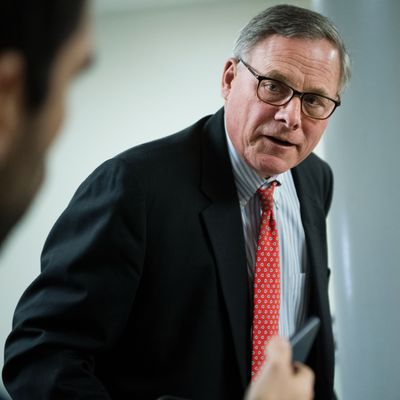
A handful of Republican Party elites have recoiled from Donald Trump, being driven into opposition by the president’s grossness. A larger number have thrown themselves enthusiastically behind him. In the middle is a quiet group that has accepted and enabled Trump, though sometimes pushing back quietly.
Richard Burr, who is now entangled in a stock-trading scandal, is an emblematic leader of the middle group. Burr has presided over the Senate Intelligence Committee, which he chairs, in a somewhat bipartisan fashion, enraging Trumpists by failing to promote their conspiracy theories and commit fully to covering up the president’s misconduct. His acts of rebellion are mild and irregular, as if he is being tugged back and forth between self-preservation and the demands of his conscience.
The trading scandal is, in this sense, a perfectly characteristic act. Last month, Burr became convinced the coronavirus posed a terrifying public-health and economic threat. Yet the Trump administration was still pursuing a denialist line in the hope it could prop up the stock market. So Burr worked out the contradiction as he usually does. He privately warned a group of affluent, well-connected insiders that the virus was far more dangerous than Trump allowed. Publicly, he toed the line, touting Trump’s vigilance in leading the United States, which was “better prepared than ever before to face emerging public health threats, like the coronavirus, in large part due to the work of the Senate Health Committee, Congress, and the Trump administration,” as he wrote in a cheerful Fox News op-ed. Behind the scenes, Burr was dumping his stock portfolio, selling between $628,000 and $1.72 million in 33 transactions.
Burr was smart enough to see through the absurdity of Trump’s public stance. He was just brave enough to share his misgivings behind closed doors. Ultimately he decided to save his own skin.
A Burr aide attempting to defend his trades instead managed to confirm the indictment. “Senator Burr filed a financial disclosure form for personal transactions made several weeks before the U.S. and financial markets showed signs of volatility due to the growing coronavirus outbreak,” as if the fact that Burr dumped his stock before the markets caught on is evidence of innocence rather than the opposite.
Senator Kelly Loeffler, a Georgia Republican, likewise dumped millions of dollars of stock immediately after being privy to a January briefing from Dr. Anthony Fauci and the CDC. Loeffler’s denial, unlike Burr’s, at least manages to avoid self-incrimination. “I do not make investment decisions for my portfolio. Investment decisions are made by multiple third-party advisors without my or my husband’s knowledge or involvement,” she said. Yet it is hard to explain why she engaged in a sudden mass sell-off, while also increasing her stake in two telecommunications firms, which stood to gain from a mass quarantine. If Loeffler truly had no involvement in these moves, whoever did make those decisions had the prescience to move decisively, and well before the markets caught on. Loeffler, naturally, did not contradict Trump’s public complacency.
MAGA world quickly denounced Burr, with Tucker Carlson publicly demanding his resignation. This is a luxury Trump supporters enjoy because they were already predisposed against Burr for his gestures of independence. Likewise, Loeffler is facing a primary challenge from Representative Doug Collins, a Trump cultist who has positioned himself as one of the most fanatic defenders of the president’s Ukraine extortion scheme.
More importantly, they enjoy the luxury because Trump and his family members have concealed their financial interests. Members of Congress are required by law to disclose their holdings. That’s how we know about Burr and Loeffler. The president is only required by custom, and he has flouted it. He is also compelled by law — the House Ways and Means Committee exercised its legal right to examine his tax returns — but Trump flouted that too. He is fighting a legal battle to withhold his financial interests. The Supreme Court was scheduled to hear the final arguments in Trump’s last-ditch appeal, but has postponed them due to the coronavirus.
Unless society can return to normal functioning within a couple months, Trump may push the settlement beyond the election. Astonishingly, Trump’s mismanagement of the virus may spare him from abiding basic norms of transparency.
It is worth pointing out that Trump has worked closely with the private sector, taking advice from executives and using them essentially as public proxies. Jared Kushner has set up a parallel coronavirus task force composed largely of businesspeople. Kushner is not even an official member of the administration, and is likewise spared from any disclosure requirements. It is also worth pointing out that Trump has understood the pandemic from the beginning as primarily a stock-market input. He has angrily charged Democrats and the media with fomenting hysteria to manipulate the market downward. Trump’s habit of projection is so well established that his accusations can be treated as presumptive confessions.
Of course the story of Trump’s mismanagement of the coronavirus is not primarily a story of greed. It is a story of incompetence and myopia. In the center of it sits a mad king, first unable to focus on a danger played out on a longer time scale than a day, and then thrashing about helplessly, unable to organize and lead a focused response. But we are going to learn that as this catastrophe unfolded, the people surrounding the mad king responded in different ways. Some threw themselves into the work of trying to spare their country the worst. And some sought to fill their pockets while there was still time.
We’re committed to keeping our readers informed.
We’ve removed our paywall from essential coronavirus news stories. Become a subscriber to support our journalists. Subscribe now.






























